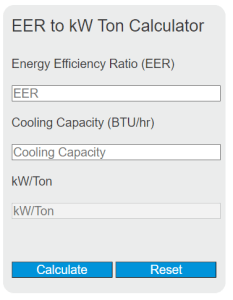Energy Efficiency Ratio (EER) to Kilowatt Tons (kW/ton) Converter
Result:
Understanding EER to kW Ton Conversion
The EER (Energy Efficiency Ratio) and kW Ton (kilowatt tone) are crucial metrics in HVAC (Heating, Ventilation, and Air Conditioning) systems. Knowing how to convert from EER to kW ton can help you evaluate and compare energy efficiency across different cooling systems. Here, we’ll explore how to effectively convert EER to kW ton.
How to Convert EER to kW Ton
To convert EER to kW ton, you can use the following formula:
kW ton = EER / 3.517This formula arises because 1 ton of cooling is equivalent to 3.517 kW. Thus, dividing the EER value by 3.517 gives you the tonnage in kilowatts.
Steps to Use the Conversion Formula
- Determine the EER value of your HVAC system.
- Apply the formula: Divide the EER by 3.517.
- The result is the usage in kW tons.
Benefits of Using the Conversion
Understanding how to convert EER to kW ton can help you:
- Make informed decisions on HVAC purchases.
- Evaluate energy efficiency for cost-saving purposes.
- Compare different models effectively.
Common Mistakes When Converting EER to kW Ton
One common error is forgetting to adjust the units properly, which can lead to inaccurate conclusions about system efficiency. Make sure to always check your calculations!
10 Key Facts About EER to kW Ton
- How does EER to kW ton work? It works by dividing the EER value by 3.517.
- Can you easily EER to kW ton? Yes, especially if you follow the conversion formula provided.
- Why is it important to know this conversion? To evaluate energy efficiency and optimize costs.
- What is a good EER rating? Ratings above 12 are generally considered efficient.
- How is EER different from SEER? EER measures efficiency at a specific temperature, while SEER averages performance over various conditions.
- What tools are available for conversion? Many online calculators can assist with EER to kW ton conversions.
- Does EER impact environmental factors? Yes, a higher EER indicates less energy consumption, reducing carbon footprint.
- Can you compare EER across brands? Absolutely, ensuring fair competitiveness in energy efficiency.
- Is a higher EER always better? Generally yes, but the system’s specific application and costs also matter.
- Are there alternative methods to find kW ton? Yes, HVAC professionals can help provide more accurate assessments.
Ok, not sure I get the title, but this sounds interesting! 😅 Any explanation on what ‘eer to kw ton’ even means? Cal me curious! lol
Whoa, I’m intrigued but also lost! Eer to kw ton sounds like a riddle! Can’t wait to see how you break it down. What inspired you to write about this?